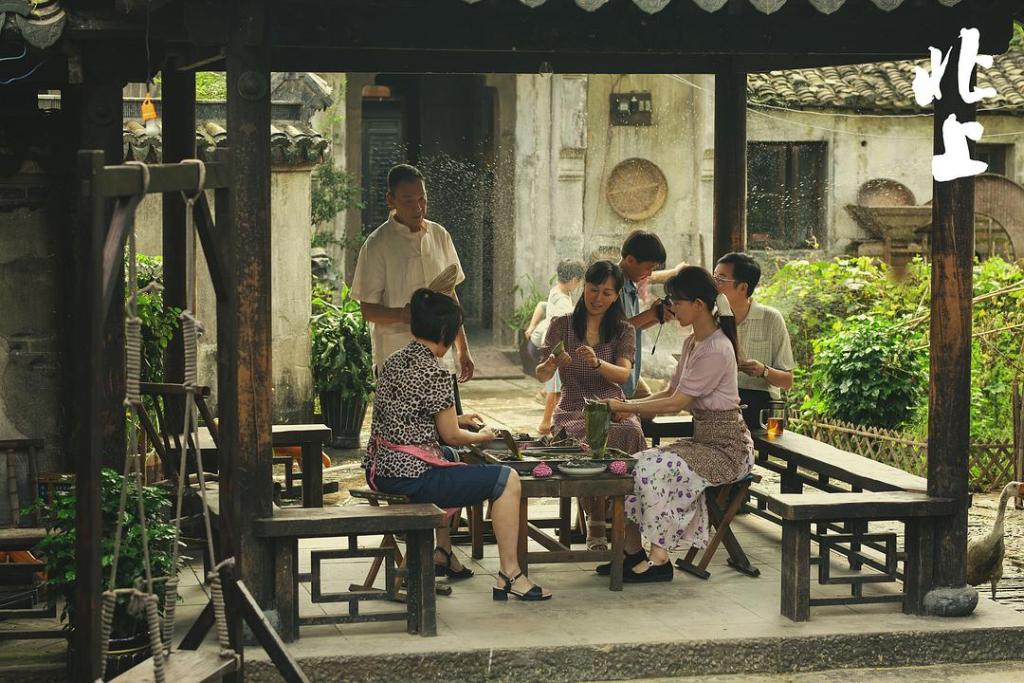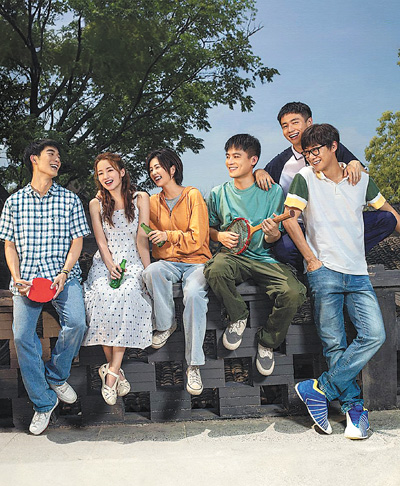
Bai Lu and Ou Hao talk about "Northward": Continuing the story of the canal
Gao Dan, reporter of The Paper
There are not many TV dramas with the Grand Canal as the background. The creation of works about the Grand Canal requires both a broad historical perspective and a contemporary cultural value perspective. The recently aired TV drama "Northward" has made a positive attempt to connect the "slowness" of traditional China with the "speed" of modern China.
"Northward" is adapted from Xu Zechen's novel of the same name, which won the Mao Dun Literature Prize. It depicts the unique geographical features and cultural customs along the Beijing-Hangzhou Grand Canal. The story focuses on a small courtyard along the canal, and from the perspective of a group of ordinary "post-90s" youth, it shows how the canal is integrated into their growth. On April 14, a seminar on the TV series "Northward" was held in Beijing.
Xu Zechen, the original author of "Go North", said that every art form has its own rules. "Go North" has been adapted into a drama and a musical before. "Every art form makes its own choices based on its own characteristics. I think every effort is self-consistent and valid within its own framework and artistic logic."
The main creators introduced that in order to present the canal style and contemporary landscape, the "Go North" crew visited Kunshan Bacheng Old Street, Suzhou Ancient City, Wuxi Three Kingdoms Water Margin City, and the Grand Canal Museum, and also deeply incorporated various intangible cultural heritage elements such as Kunqu Opera, storytelling, bamboo carving, and Suzhou embroidery into the play, and displayed the canal style through canal delicacies such as Huaiyang Caiyou Dunzi.

Stills from "Northward"
Xu Zechen shared that as a Jiangsu native, he was very happy to see his feelings for the canal spread and radiate to a greater extent in this drama. Xu Zechen said: "Since the broadcast of "Going North", there has been continuous good news. People in Huai'an told me that they feel that the Flower Street is a bit short and can't accommodate so many tourists. My hometown is Donghai, Lianyungang. My hometown produces crystal. Locals say that crystal is selling very well now. In order to cope with the continuous flow of merchants and tourists, our Crystal City has started to operate 24 hours a day."
Zhang Shuwei, the chief producer of "Go North", feels the same about Xu Zechen's feelings towards the canal. He believes that Huajie is not only a geographical coordinate but also a spiritual totem that will never collapse in the hearts of wanderers. Xu Zechen's writing about the canal is to deconstruct the eternity of his hometown with the fluidity of water. The canal is a mirror that reflects the life dialectics of every Chinese about roots and operation. "The old country has a new destiny. The old country of the canal is the thick soil of a thousand-year cultural context, and the new destiny needs to be continued by the young people on Huajie today."
Xu Zechen's feelings for the canal were also passed on to the young actors. Bai Lu, who plays "Xia Fenghua", said that she also grew up by the canal. "In my eyes, the Grand Canal is just like what is presented in our play. It is a place full of the atmosphere of urban life, witnessing the ups and downs of the fate of countless people, and carrying the various aspects of life of the canal people. I am very lucky to be able to play a play related to my hometown. I hope I can do my best to interpret the spirit of the times of the children of the canal and let more young people pay attention to the changes of the times."
Completely different from the roles she played before, Xia Fenghua's life tone is impetuous and fearless. "The hardships of life and time have gradually made her more stable. During the years of entrepreneurship in Beijing, Xia Fenghua packaged the express station she contracted as if it were a warm little home. With the empathy of a stranger, she created another home for her employees who were also wanderers. She was like the canal that runs through her, hiding all the storms and twists and turns, leaving only the quiet water and the endless flow, bringing hope of life to many people." Bai Lu said.

Xia Fenghua played by Bai Lu
Bai Lu said that in order to express her determination to portray the role of Xia Fenghua, she went through a double transformation from appearance to soul. "Cutting my hair short, wearing braces, and blackening my skin was my first encounter with the character of Xia Fenghua. Learning about Xia Fenghua's struggle history in the script was the process of my acquaintance with her, and the spiritual temperament that radiated from her was the spiritual interaction between her and me. It was Xia Fenghua who allowed me to stand by the ancient canal and touch the youthful spirit of the canal system. There is a line in our play that I like very much - 'The tide of the times ultimately left its mark on everyone'. Xia Fenghua and I have both left our own marks of the times. It was she who taught me that as a young generation, I must always maintain the spirit of hard work, enterprising spirit, and responsibility, and continue to shine in my own field."

Bai Lu's speech
Ou Hao, who plays the role of "Xie Wanghe", said that he and his character have many similarities. "Wanghe grew up by the canal, and I grew up by the sea. Their family runs ships, and so do ours. They run river shipping, and we run sea shipping. Both families have experienced the ups and downs brought about by the changing times, so from the perspective of character personality, we are both the type of people who do more and talk less, and are more proactive."
There is a line in the play that touched Ou Hao deeply - "When the shipping capacity was insufficient, the status of the ship captain was very high. Unfortunately, the times have passed, and they are still living in the past, living in the glorious honor of the past." In Ou Hao's eyes, the canal is not a background, but a witness of the times, and even a silent protagonist. "The canal is not only a river in the geographical sense, but also a waterway that carries the fate of countless ordinary people. Because of the similar growth trajectory with Xie Wanghe, I know that every ship on the canal means much more to every family than just supporting the family, and it also contains deep emotions."

Ou Hao made a speech
